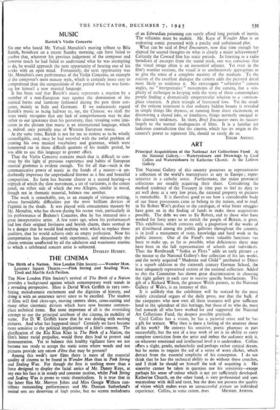MUSIC
Bartok's Violin Concerto No one who heard Mr. Yehudi Menuhin's moving tribute to Bela Bartok, broadcast on a recent Sunday morning, can have failed to resolve that, whatever his previous judgement of the composer and however much he had failed to understand what he was attempting to do he would approach the next opportunity of hearing one of his work; with an open mind. Fortunately, the next opportunity was Mr. Menuhin's own performance of the Violin Concerto, an example of the composer's most mature style, which is certainly more easy to comprehend than the compositions of the period when he was form- ing for himself a new musical language.
It has been said that Bartak's music represents a reaction by a member of a non-European race against the domination of the musical forms and harmony fashioned during the past three cen- turies, mainly in Italy and Germany. If we -audaciously regard Bartok's music as being halfway to say, the Chinese, we shall the more easily recognise that any lack of comprehension may be due rather to our ignorance than his perversity, thus revealing some limi- tation in the dictum that music is an international language, which is, indeed, only partially true of Western European music.
At the same time, Bart.* is not for me so remote as to. be wholly unintelligible, and, once he had wrestled with the awful problem of creating his own musical vocabulary and grammar, which were hammered out in those difficult quartets of his middle period, he was able to use this language to greater effect.
That the Violin Concerto contains much that is difficult to con- strue by the light of previous experience and habits of European musical grammar is evident enough. Yet for all that—such is the communicative power of music in the hands of a master—it un- doubtedly impresses the unprejudiced listener as a fine and beautiful composition. Its form has become clearer at a second hearing—a triptych of which the slow movement, a set of variations, is the centre panel, on either side of which the two Allegros, similar in mood, though not in thematic material, balance one another.
The work is remarkable, too, as an example of virtuoso writing, whose formidable difficulties put the most brilliant devices of Paginini in the shade. It was played with consummate mastery by Mr. Menuhin, who has shown during his recent visit, particularly in his performance of Brahms's Concerto, that he has matured into a great interpretative artist. A few years ago, when his performancet had lost their original freshness and boyish charm, there seemed to be a danger that he would find nothing with which to replace those qualities, that he would achieve only an empty perfection. Now his interpretation has deepened with experience, and miraculously the charm remains unaffected by all the adulation and wearisome routine to which a celebrated concert artist is subjected.
DYNELEY HUSSEY.






























 Previous page
Previous page